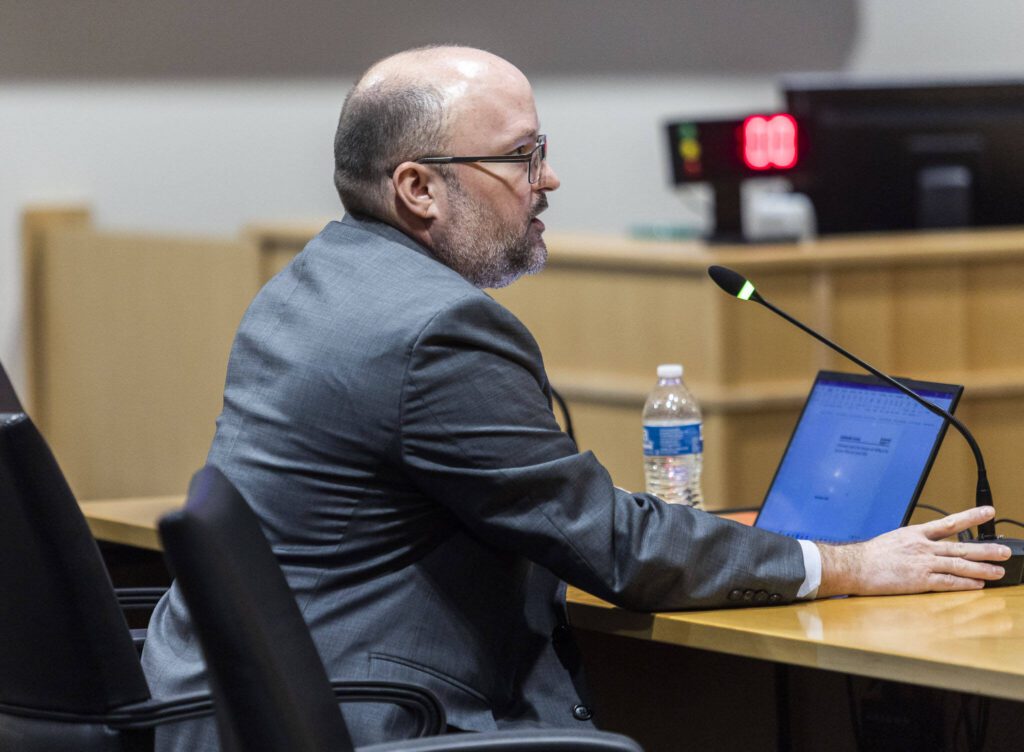EVERETT — A new report released by a third-party auditor found a series of questionable hiring practices in the Snohomish County Executive Office.
The report mostly details issues within the Office of Social Justice and the Office of Recovery and Resilience, both housed in the executive branch of county government.
The county created the Office of Social Justice after George Floyd’s murder in 2020. The Office of Recovery and Resilience was created to distribute COVID funds.
The report found overlapping duties between the two offices and other county departments. It also said Executive Dave Somers’ office could do more to track and measure the impact of programs.
On Wednesday, George Skiles, of Sjoberg Evashenk Consulting, presented his audit to the County Council.
Position creation and compensation within the executive’s office did not always follow Human Resources protocols for hiring, according to the audit.
On at least one occasion, a job description was created after a position was already filled. Other employees received multiple wage step increases without going through a standard merit process that usually would be required. Instead, changes in position and pay utilized the budget process and didn’t involve Human Resources.
It was not, however, limited to the executive office. At least 73 pay adjustments were completed through the budget process over the past 10 years, the report found.
“We learned through the audit that this practice was relatively widespread among county departments,” Skiles said. “This included reclassifying positions from one job to another without giving Human Resources the opportunity to review the expectations of the new job via job description, evaluating market compensation for that type of work and setting up a new position and compensation in a manner that ensures pay aligns with the responsibilities and ensures pay equity among positions throughout the county.”
The audit issued eight key recommendations:
• Consider adding staff to create capacity for proactive policy analysis and in-house legal counsel within the council office;
• Transfer the tourism and economic development programs to the Department of Economic Development;
• Transfer the COVID recovery work housed within the Office of Recovery and Resilience to the Department of Finance;
• Transfer the human resources and grant-related activities performed by the Office of Social Justice to existing county departments, such as Human Resources or Human Services; at the same time, continue to champion social justice through the executive’s office;
• Follow Human Resources’ protocols for creating and changing positions and compensation;
• Develop and report on performance metrics relevant to economic development and social justice, and consider developing performance dashboards for all county departments; and
• Consider establishing a dual employment policy that applies to both the council and executive offices.
In line with the recommendation, the county is planning to move COVID recovery activities to the finance department, executive office spokesperson Kari Bray wrote in an email.
“We run a lean operation, but because of our employees and our thoughtful use of resources, we are able to accomplish a lot for the people of Snohomish County,” Bray said. “The report includes a list of recommendations. We constantly strive to do better, and recommendations help shape our next steps.”
Placeholder job titles have also been an issue in the county, including one instance where an employee held a job for three years before a job description was created. This partially stemmed from the county’s human resources and budget systems apparently not being connected.
Placeholder titles were used at least 37 times in 12 different departments, the report states. The county is addressing this issue, Skiles said.
The audit also mentioned dual employment, a practice the report said there are “risks” to.
At least one elected official — state Sen. Marko Liias, D-Mukilteo — works for the county. Liias was hired in September 2021 and worked in the Office of Recovery and Resiliency in communications. Reached for comment this week, Liias directed questions to the county.
Liias also briefly held a title in the Department of Emergency Management, but did not perform any work there. It was a placeholder title, Bray said.
“The common practice has been to identify a position that is comparable for budget purposes (namely, pay grade/range) and then that is approved in the budget — it’s a ‘placeholder’ position,” Bray wrote in an email. “Following the approval of the position in the budget, job titles and descriptions have then been finalized through Human Resources. The emergency management position was a placeholder in the budget process. The job for which it was repurposed has consistently been in communications support, outreach, and engagement.”
Other politicians have also found jobs within the executive department. Former Sheriff Ty Trenary holds a position in the office, as does former County Council member Terry Ryan. Another former County Council member, Stephanie Wright did as well, stepping down from her elected position to do so.
Over the past 10 years, staffing resources dedicated to the executive’s office have increased 41%.
The office had 31 full-time equivalent positions this year, up from 14 in 2018. The “growth in staffing resources is largely reflective of grant-funded positions assigned to certain special offices or programs administered by the Executive Office,” the audit states.
Meanwhile, the County Council has added 0.375 full-time equivalent roles since 2014.
The report determined the executive office was neither over or understaffed. However, unlike most municipalities, COVID dollars in Snohomish County were distributed via the executive’s office. Comparison counties in Washington used their financial departments, instead of setting up a new office to distribute the money.
Snohomish County said its finance department simply did not have the capacity.
“Our Finance Department is extremely lean and does not have capacity to develop and run community-informed programming for a temporary but significant influx of one-time federal funds,” Bray said. “Community engagement also is not part of the typical book of work for Finance, and that was identified as an important element of managing our ARPA funds from the beginning.”
County Council member Jared Mead said he has taken “issue” with decisions made in the executive’s office, specifically about who has been hired, and for what.
“Now the performance audit results have come out and, surprise, they’re recommending to basically reorg and restructure because of redundancies that were created with bad position control,” Mead said in an interview. “Let’s fix that.”
On Wednesday, Mead proposed a budget amendment that essentially would accept the audit’s findings and implement some of the recommendations. The amendment would cut some positions in the executive office and cut some funding for the Office of Social Justice.
Skiles said Mead’s amendment was “consistent” with the findings of the report. Council member Strom Peterson said he had problems with it, arguing that council ordering the executive office to do something was overstepping council’s authority.
“It’s a dangerous path to go down,” Peterson said.
Jordan Hansen: 425-339-3046; jordan.hansen@heraldnet.com; X: @jordyhansen.
Talk to us
> Give us your news tips.
> Send us a letter to the editor.
> More Herald contact information.



























